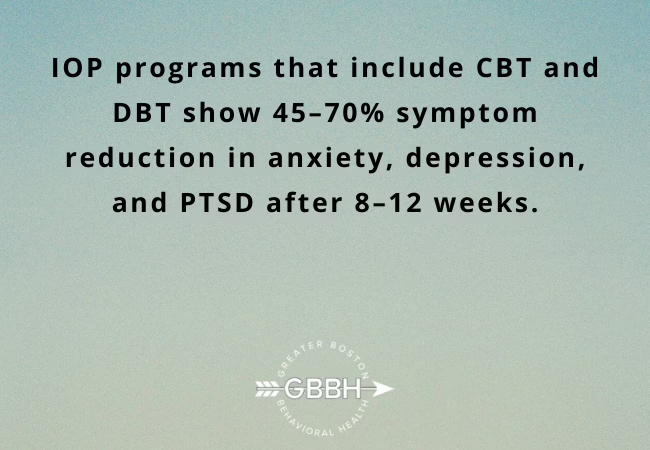If you’re struggling with anxiety, depression, or the lingering effects of trauma, you might be asking yourself: What kind of help do I really need? Weekly therapy may no longer feel like enough, yet committing to inpatient or residential care might not be realistic. Fortunately, there’s a middle ground—a highly effective one called an Intensive Outpatient Program (IOP).
At Greater Boston Behavioral Health, our Intensive Outpatient Program in Boston is specifically designed for people who need more than traditional outpatient therapy but still want to maintain their daily lives. This includes individuals navigating moderate to severe symptoms of anxiety, depression, and trauma—often complicated by emotional dysregulation or co-occurring conditions.
In this blog, we’ll explore how IOP works, who it’s designed for, and why it might be the right next step in your mental health journey.
What Is an Intensive Outpatient Program (IOP)?
An IOP is a structured mental health program that typically includes 3–5 days of therapy per week, for 2–4 hours each day. It’s more intensive than standard outpatient care, yet more flexible than a Partial Hospitalization Program in Boston (PHP) or a Residential Treatment Program in Boston.
At Greater Boston Behavioral Health, our IOP includes:
- Individual therapy
- Group therapy sessions
- Cognitive Behavioral Therapy Boston (CBT)
- Dialectical Behavior Therapy in Boston (DBT)
- Trauma-informed care
- Anger Management Therapy in Boston
- Psychiatric assessment and medication management
- Relapse prevention and life skills development
Whether you’re working, parenting, or studying, IOP allows you to continue living at home while receiving focused, daily therapeutic support.
IOP for Anxiety: Regain Control Without Isolation
Anxiety can feel overwhelming, exhausting, and all-consuming. If you’re dealing with:
- Panic attacks
- Intrusive or racing thoughts
- Social anxiety
- Constant worrying that affects your work or relationships
- Avoidance behaviors that interfere with your routine
…then IOP may be the ideal treatment setting.
How IOP Helps:
- CBT helps you reframe anxious thought patterns and build practical coping skills.
- DBT teaches mindfulness, emotional regulation, and grounding strategies.
- Group therapy offers support, validation, and exposure to anxiety triggers in a safe environment.
- Medication management through our Psychiatric Care in Boston helps stabilize the physical symptoms of anxiety.
Unlike inpatient care, IOP allows you to practice anxiety-reduction strategies in real time—whether that’s managing social interactions, public speaking, or transitions in your daily life.
IOP for Depression: Daily Support to Rebuild Your Life
Depression doesn’t just make you feel sad—it can make it hard to function at all. Signs that depression might require IOP include:
- Persistent fatigue and sleep disruption
- Loss of interest in things you used to enjoy
- Trouble concentrating at work or school
- Feelings of worthlessness or hopelessness
- Isolation or withdrawal from loved ones
- Suicidal thoughts (without immediate risk requiring inpatient care)
How IOP Helps:
- Structured, consistent support helps interrupt the isolation-depression cycle.
- Group therapy encourages connection and validation from others with shared struggles.
- Therapists help clients create realistic goals, daily routines, and positive habits that promote mood improvement.
- CBT and DBT help address cognitive distortions and develop emotional balance.
Our IOP gives clients with depression a pathway back to purpose, self-esteem, and motivation—without stepping completely away from life.
IOP for Trauma: Healing Without Re-Traumatization
Whether from a single event or complex, long-term experiences, trauma can leave deep emotional scars. Signs that trauma may be interfering with your life include:
- Flashbacks, nightmares, or intrusive memories
- Hypervigilance or exaggerated startle responses
- Emotional numbness or detachment
- Difficulty with trust, intimacy, or emotional expression
- Disassociation or loss of time
- Self-destructive behaviors or emotional shutdowns
How IOP Helps:
- Trauma-informed therapists offer a safe, validating environment where you can share at your own pace.
- We use evidence-based therapies like CBT and DBT to help you build stability before deeper trauma processing.
- Skills like distress tolerance, grounding, and emotion regulation allow you to stay present and connected during difficult moments.
- IOP provides daily structure that promotes predictability, emotional safety, and therapeutic momentum.
While full inpatient trauma treatment may be necessary for some, many trauma survivors find IOP to be the perfect balance of support and autonomy.
Is IOP Right for You?
You may be a good fit for IOP at Greater Boston Behavioral Health if you:
- Have moderate to severe mental health symptoms, but do not require 24/7 supervision
- Are transitioning from an Inpatient Treatment Program in Boston or Residential Treatment Program in Boston
- Are finding weekly therapy insufficient to manage your symptoms
- Need structured support to avoid relapse or hospitalization
- Are stable enough to benefit from group participation and therapeutic homework
- Want to keep working, attending school, or caring for family while in treatment
IOP is especially effective when used alongside our other Mental Health Programs in Boston, forming a step-down or step-up part of your treatment journey.
When Weekly Therapy Isn’t Enough—Why IOP Bridges the Gap
Many individuals start their mental health journey with weekly outpatient therapy—and for some, that’s enough. But when symptoms intensify or begin interfering with work, relationships, or self-care, a more structured approach is needed.
Here are signs that it may be time to step up to an Intensive Outpatient Program:
-
You’re struggling to manage daily responsibilities because of anxiety or low mood
-
You leave therapy feeling overwhelmed or unsupported between sessions
-
You’re facing trauma triggers that are escalating in frequency or intensity
-
You’ve had a recent setback, relapse, or hospitalization
-
You’re not making progress in weekly therapy, or symptoms are returning quickly
IOP offers a higher frequency of contact with clinicians, more peer support, and immediate tools to stabilize and cope—without requiring a complete pause on your daily life.
What a Typical Day in IOP Looks Like
If you’re wondering what IOP looks like in practice, here’s a breakdown of a typical day at Greater Boston Behavioral Health:
Morning or Evening (Depending on Schedule):
-
Check-In and Mindfulness Practice: A grounding exercise to reduce anxiety and build focus
-
Group Therapy: Led by a licensed therapist, these sessions focus on themes like trauma recovery, emotional regulation, relationships, and relapse prevention
-
Skills Training Workshop: Based on CBT or DBT principles, such as managing cognitive distortions, practicing distress tolerance, or improving interpersonal communication
-
Break and Reflection: Clients have space to rest, journal, or connect with peers
-
Individual Therapy (1–2x/week): Clients meet with their personal therapist to work on individualized goals
-
Medication Check-Ins (As Needed): Meetings with a psychiatric provider for evaluation or medication management
This structure creates daily momentum for healing, with the flexibility to return home and apply new skills in real life.
What Makes Our IOP Different?
At Greater Boston Behavioral Health, we understand that no two people are the same. That’s why our Mental Health Treatment Center Boston offers:
- Customized care plans tailored to your diagnosis, goals, and daily life
- Expert clinicians trained in CBT, DBT, trauma therapy, and anger management
- In-house psychiatric care for medication evaluation and management
- Holistic support including mindfulness, relapse prevention, and goal setting
- Seamless transitions to other levels of care like PHP, inpatient, or ongoing outpatient support
Whether you need help processing trauma, managing panic attacks, or climbing out of a depressive episode, our IOP offers real help in real life.
Conclusion
You don’t have to choose between healing and maintaining your daily life. With an Intensive Outpatient Program, you can receive consistent, evidence-based support for anxiety, depression, and trauma—while continuing to live at home, go to work, or care for your family.
At Greater Boston Behavioral Health, we help you reclaim your life with confidence and clarity, one day at a time. Call (888) 278-0716 to schedule a confidential assessment and find out if our IOP is right for you.
FAQ on IOP for Anxiety, Depression, and Trauma
What is an IOP and how is it different from inpatient care?
An Intensive Outpatient Program (IOP) provides structured therapy several days a week but allows clients to live at home. It offers more flexibility than inpatient or residential programs.
Is IOP effective for treating anxiety and panic attacks?
Yes. IOP uses therapies like CBT and DBT to help clients manage anxious thoughts, reduce panic symptoms, and build coping strategies in real-time.
Can I keep working or going to school while in IOP?
Absolutely. IOP sessions are usually scheduled during morning or evening hours so that clients can continue with work, school, or family responsibilities.
How does IOP help with depression?
IOP offers daily therapeutic support, group engagement, medication management, and skill development to help lift depressive symptoms and promote connection and motivation.
What if I have trauma and emotional dysregulation?
Our trauma-informed IOP includes DBT and grounding techniques to help clients manage distress, regulate emotions, and build resilience in a safe, supportive setting.


